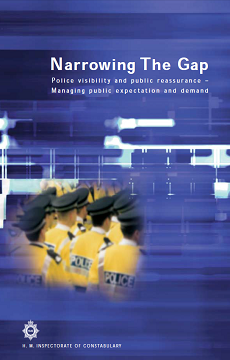This study examines the impact of police visibility on public reassurance against the backdrop of a time of change in policing in Scotland, in which we find:
- developments on intelligence-led policing;
- significant advances in technology; and
- a growing impetus in performance evaluation.
In addition, this report follows a review by the Scottish Executive of policing structures in Scotland which endorsed the retention of the existing eight forces but initiated an ongoing study of common police services.
Number | Recommendation |
|---|---|
1 | That forces consider the detailed findings of the research carried out by Market Research UK and combine the outcomes with information from their own consultative processes. |
2 | That forces take renewed steps to review the extent to which they are engaging with and are accessible to their communities, particularly in relation to quality of life issues connected to young people. |
3 | That the Scottish Executive, in liaison with stakeholders, undertake a review of the statutory definition of the police role commensurate with 21st-century demands and expectations. |
4 | That the Scottish Executive, Police Staff Associations and Police Authorities engage in a robust review of Core Roles and Responsibilities which takes full account of the findings of the Bureaucracy Task Force within the Scottish context. |
5 | That the Scottish Executive, ACPOS and Police Authorities examine ways to promote recruitment more effectively and competitively market policing as a career in the light of projected turnover. This should embrace a research study of the employment market to inform the strategic recruitment needs of the service and should take full account of the emerging developments in the use of wardens. |
6 | That forces give added impetus to the review of efficiency of shift systems and consider accentuating the role of resource managers and computer-assisted resource management systems to aid efficient deployment. |
7 | That ACPOS and the Scottish Executive address occupational health within a developing human resource strategy to ensure best practice and consistent management. |
8 | That as part of the commitment to community consultation ACPOS and the Scottish Executive undertake a review of existing practices to establish relevant performance indicators in respect of the effectiveness of problem-solving policing systems in addressing fear of crime. This would enable improvements to be made in evidence based policy and allow performance benchmarking in this critical area. |
9 | That ACPOS as part of its commitment to achieving consistency of approach to mainstreaming the National Intelligence Model (NIM) develop a project plan, with specific tasks, a timescale and evaluation criteria to support developments in this important area. |
10 | That forces examine and develop the opportunities which exist to optimise community intelligence, firstly to provide a foundation for the higher-level intelligence framework within NIM and secondly to act as a catalyst for meaningful problem solving within tactical tasking and co-ordinating. |
11 | That ACPOS encourage further enhancement of problem-solving policing as a means of addressing local issues and consolidating the community-planning ethos. |
12 | That forces accord due status to patrol and community policing as distinctive elements of service delivery. |
13 | That ACPOS further draws on the lessons of the Safer Scotland concept to assess the scope for consistently addressing priorities across forces in ways which heighten effective policing while remaining sensitive to local needs. |
14 | That, within existing arrangements, forces set targets to increase the number of active special constables. |
15 | That ACPOS explore novel ways of engaging civic interest and skills in voluntary assistance to the police within the community. |
16 | That the Police Advisory Board for Scotland oversee a wide-ranging review of the Special Constabulary in the medium term. |
17 | That forces consider their local media arrangements specifically to better balance the perception whereby fear of crime is disproportionate to the risk of crime, and within which the established needs of communities are emphasised, as well as fluctuating trends in crime. |
18 | That ACPOS develop a national media/marketing strategy for the Scottish Police |
19 | HMIC fully endorses the approach by ACPOS towards the establishment of a single, nonemergency number and recommends the continued development of this project coherently linked to developments in information technology. |
20 | Within the compass of the ongoing common police services review, HMIC recommends that ACPOS, along with relevant stakeholders, initiates a best value review of call centres and control rooms to ensure optimum integration of use across/between forces and other emergency services and that ACPOS should ensure a robust, consistent strategy to provide guidance on call grading and call management. |
21 | That forces increase the provision of Customer Service training to personnel involved in direct or indirect contact with the public and link this where possible to qualitative performance monitoring. |
22 | That ACPOS and the Scottish Executive develop a national strategy of road signage to police stations. |


